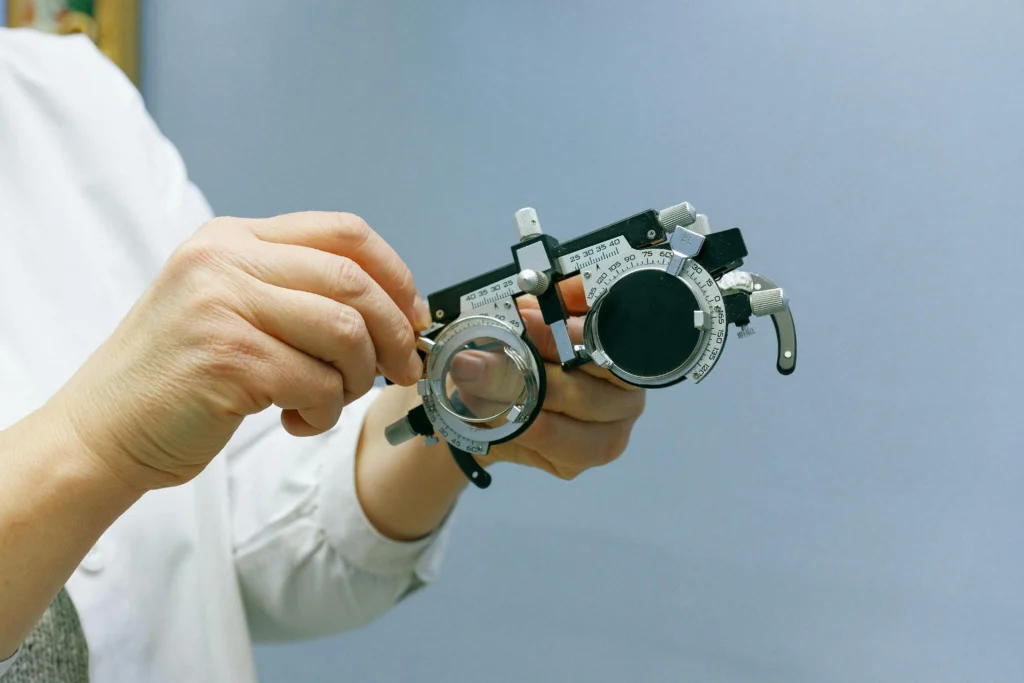Cataracts develop slowly, often without pain, making them easy to overlook in the early stages. However, identifying the early signs of cataract can help prevent serious vision impairment and ensure timely treatment.
At Thind Eye Hospital, a NABH-accredited super-specialty center in Jalandhar, early cataract diagnosis and management are handled by leading experts using state-of-the-art technology. Under the guidance of Dr. Jaswant Singh Thind, one of the most experienced cataract surgeons in Punjab, the hospital has helped thousands of patients regain clarity and confidence through timely cataract detection and treatment.
If you’re noticing vision changes or wondering when to see an eye doctor for cataracts, this article will help you recognize key symptoms of cataracts in Jalandhar and take proactive steps for better eye health.
What Is a Cataract?
A cataract is the gradual clouding of the eye’s natural lens, leading to blurred or dim vision. It typically occurs with age but can also result from prolonged UV exposure, diabetes, smoking, or eye injuries.
In its early stages, the cataract may not cause major vision problems, which is why understanding the early signs of cataract is crucial for timely diagnosis and treatment.
Early Signs of Cataract You Shouldn’t Ignore
Recognizing the early signs of cataract can make all the difference in preserving your vision. Here are the most common symptoms to watch for:
1. Cloudy or Blurry Vision: If your vision appears hazy or blurred, like looking through a fogged-up window, it could be one of the first symptoms of cataract. Early clouding makes it difficult to see fine details clearly.
2. Increased Sensitivity to Light: Experiencing discomfort or glare while looking at bright lights, sunlight, or headlights at night can indicate developing cataracts.
3. Faded or Dull Colors: Colors may seem less vibrant, and whites might appear yellowish, one of the subtle early signs of cataract that often goes unnoticed.
4. Poor Night Vision: If driving at night becomes difficult due to glare or low visibility, it’s time to consider cataract detection in Punjab.
5. Frequent Prescription Changes: Needing frequent updates to your eyeglass or contact lens prescription is a classic indicator that cataracts may be forming.
6. Double Vision in One Eye: Seeing double or multiple images in one eye is another early symptom, often caused by irregularities in the clouded lens.
When to See an Eye Doctor for Cataract
Many patients delay seeking treatment because early cataracts are painless. However, experts recommend seeing an eye doctor as soon as you notice:
- Blurry or cloudy vision
- Difficulty reading or seeing in low light
- Glare or halos around lights
- Dull or faded colors
At Thind Eye Hospital, our specialists perform a detailed eye examination to identify even the faintest early signs of cataract and determine whether surgery or lifestyle management is necessary.
If you’re in or around Jalandhar, don’t wait; schedule your cataract detection in Punjab early for the best outcomes.
Cataract Detection and Diagnosis in Punjab
Modern cataract detection is quick, painless, and highly accurate. At Thind Eye Hospital, patients undergo advanced diagnostic procedures, including:
- Slit-Lamp Examination: For direct observation of the lens.
- Retinal Evaluation: To rule out other vision disorders.
- Visual Acuity Test: Measures sharpness and clarity of vision.
- Digital Eye Scans: High-resolution imaging to detect even minor opacities.
These advanced tools help doctors confirm the symptoms of cataract in Jalandhar and decide whether early monitoring or surgical intervention is required.
Why Early Detection Matters
Timely detection of the early signs of cataract allows for:
- Better treatment planning before vision worsens
- Minimally invasive surgery if required
- Prevention of complications like secondary eye strain or accidents
- Improved post-surgical outcomes and quicker recovery
Delaying diagnosis can result in advanced cataracts that are harder to treat and may significantly impact daily life.

Advanced Cataract Treatment at Thind Eye Hospital
Thind Eye Hospital offers the most advanced solutions for cataract management in Punjab, including:
1. Laser Cataract Surgery (Blade-Free): Performed with Femtosecond Laser technology, this painless, stitchless procedure ensures unmatched precision and safety.
2. Phacoemulsification Surgery: A micro-incision surgery using ultrasonic energy to remove the cloudy lens is fast, safe, and highly effective.
3. Premium Intraocular Lens (IOL) Options: Choose from Monofocal, Multifocal, and Toric Lenses for improved post-surgery vision and freedom from glasses. Patients benefit from comprehensive cataract detection in Punjab, advanced diagnostics, and personalized treatment by one of the region’s most trusted surgeons.
Why Choose Thind Eye Hospital
- Over 38 years of experience in cataract and laser eye surgery
- First in North India to introduce blade-free cataract surgery
- NABH-accredited facility with international recognition
- Thousands of successful cataract surgeries each year
- Led by Dr. Jaswant Singh Thind, a globally recognized eye surgeon
Prevention Tips for Cataract
While cataracts can’t always be prevented, you can delay their onset by:
- Wearing UV-protective sunglasses outdoors
- Maintaining good blood sugar control (for diabetics)
- Avoiding smoking and alcohol consumption
- Eating antioxidant-rich foods (leafy greens, carrots, citrus fruits)
- Getting regular eye check-ups
If you’re over 40, schedule annual eye exams at Thind Eye Hospital to catch the early signs of cataract before they progress.
Conclusion
Recognizing the early signs of cataract can protect your sight and quality of life. Symptoms like blurry vision, poor night sight, and faded colors are often the first warning signs.
At Thind Eye Hospital, Jalandhar’s trusted name in eye care, cataract detection in Punjab is carried out with world-class precision and patient-first care. Led by Dr. Jaswant Singh Thind, one of the region’s most experienced eye surgeons, the hospital ensures accurate diagnosis and advanced treatment options.
If you’ve noticed any symptoms of cataract in Jalandhar, don’t delay, book an appointment today and take the first step toward clearer, brighter vision.
FAQs on Early Signs of Cataract
Cloudy vision, glare, faded colors, and frequent prescription changes are the most common early signs of cataract.
Patients often report difficulty seeing at night, double vision, and light sensitivity, all early indicators of cataract.
You should consult an ophthalmologist immediately if you experience blurred or dim vision, as these are key early symptoms.
At Thind Eye Hospital, cataract detection in Punjab is done through digital imaging, slit-lamp exams, and retinal assessments for early diagnosis.
In mild cases, updated glasses and stronger lighting may help temporarily, but surgery is the only long-term solution once cataracts progress.
Dr. Jaswant Singh Thind, Chief Eye Surgeon at Thind Eye Hospital, is a leading expert in early cataract detection and advanced laser cataract surgery.


